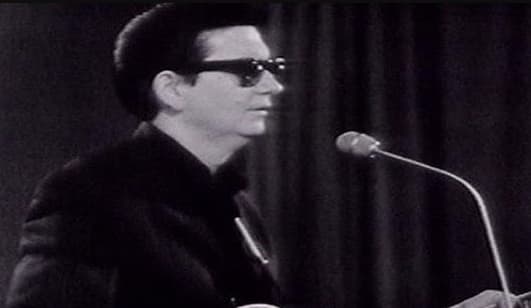
The End of an Era, a Timeless Ballad
A beautiful elegy for a dying relationship and a farewell to a fading love.
In the hallowed halls of rock and roll, few voices resonate with the raw, operatic power of Roy Orbison. His sound, a unique blend of rockabilly’s swagger and a crooner’s melancholy, stood apart in an era defined by youthful rebellion. While many of his contemporaries blasted their way onto the airwaves, Orbison carved his niche with a quiet intensity, a velvet-draped sorrow that spoke to the deepest parts of the human heart. One of the most poignant examples of this is his haunting ballad, “Goodnight”.
Released in 1965 on the album “There Is Only One Roy Orbison”, “Goodnight” wasn’t a chart-busting smash in the same vein as “Oh, Pretty Woman” or “Crying”. It reached a modest position, a testament perhaps to its introspective, almost somber nature, which contrasted with the upbeat tunes dominating the Billboard charts at the time. Yet, its quiet power has allowed it to endure, a hidden gem cherished by those who seek out the profound rather than the popular.
The story behind “Goodnight” is as heartbreaking as the song itself. Penned by Orbison with his writing partner, Bill Dees, the track emerged during a period of immense personal turmoil for the singer. The years leading up to the song’s release were marked by tragedy; the death of his first wife, Claudette Frady, in a motorcycle accident in 1966, was an unthinkable blow that would forever cast a shadow over his life and music. While “Goodnight” predates this event, it’s impossible to listen to it without feeling a sense of foreboding, a quiet surrender to the inevitable sadness of life. The song can be seen as an elegy for a dying relationship, a final, gentle farewell to a love that has run its course. It’s a moment of profound acceptance, devoid of anger or bitterness, but brimming with a profound sense of loss.
The meaning of “Goodnight” lies in its simple, yet devastatingly effective, lyrical honesty. It’s not a grand, dramatic breakup song; it’s a quiet resignation. The lyrics don’t seek to assign blame or recount grievances. Instead, they focus on the small, final moments of a shared life. The simple act of saying “goodnight” becomes a metaphor for a much larger farewell—the end of an era, the closing of a chapter. For anyone who has ever had to walk away from a love they still held dear, the song is a mirror, reflecting the quiet anguish of that decision. Orbison’s voice, in its signature tremolo, hovers between hope and despair, making the emotional core of the song feel both deeply personal and universally relatable. . The instrumentation, spare and elegant, with a slow, mournful waltz tempo, allows his voice to take center stage, a solitary beacon of sorrow in the darkness.
“Goodnight” is a masterclass in musical minimalism, a song that proves that sometimes, the quietest moments are the most powerful. For those of us who grew up with Orbison’s music, this song is a reminder of a time when songs were more than just catchy tunes; they were emotional landscapes, stories told in three minutes or less. It’s the sound of a heart breaking softly, a love letter to a love that is no more, and a timeless reminder that even in goodbye, there can be a certain, painful beauty.